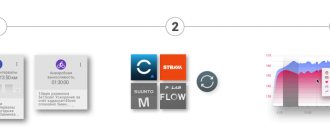Hunger is the main reason why millions of people who want to lose weight do not achieve the desired result. It would seem that everything is so simple - get less energy than you expend and the difference will be compensated from internal reserves, of which the overwhelming majority is adipose tissue. But, no... The body resists this. He carefully protects his reserves from overexpenditure, preferring to receive energy from external sources, that is, from food. And hunger is his main tool for controlling our eating behavior. By regulating the feeling of hunger, the body encourages us to think only about food, sometimes turning these thoughts into obsessive ones that haunt us at every step, fueling the fantasy of “what would I eat now” and preventing us from concentrating on something else.
When we go on a diet to lose weight, we unfortunately have to face this confrontation. Whether we can cope depends on the presence of willpower. What if this power is not there? Are there really no workarounds that lead to the goal with fewer difficulties and obstacles? Eat! But just don’t think that it will be possible, as in the advertising of some uselessness, “to do without diet and grueling exercise.” Not allowed. And it’s easy to develop tactics for following a diet that minimizes the negative impact of hunger. So, what should or should not be done for this?
No to severe energy deficit diets
Do not practice a diet with a severe energy deficit. The greater the degree of deficiency, the faster and deeper the symptoms of metabolic adaptation will appear, among which the feeling of hunger is one of the main ones. What is meant by hard deficit? 30 percent or more of maintenance calories. Maintenance calorie content is how much our body needs for all its needs, without excess or deficiency.
This value is relatively individual for everyone and it depends, first of all, on body weight and physical activity. On average, this is 28-34 calories per kilogram of body weight. We subtract 30% or even more from this and determine the level of increased risk of encountering a pronounced, haunting feeling of hunger. Accordingly, if we don’t want this, then plan a softer diet – 10-20% of the maintenance calorie level.
The downside here is that visible results will not appear soon, since the rate of weight loss is very moderate with such a degree of deficiency. But we, as a rule, want everything at once.
Physiological changes
Participants lost about 25% of their body weight. The heart rate slowed to 35 beats per minute, the frequency of bowel movements decreased, the blood volume dropped by 10%, the hearts became smaller - all this was a manifestation of a slower metabolism in the body's attempt to conserve energy. The maximum recorded decrease in basal metabolism is 15% (and so far no study has proven that metabolism decreases more and breaks down so much from hunger that a person begins to gain weight from thin air and a minimum amount of food). But people began to suffer from severe edema with general skeletal thinness, their ankles, knees and faces were swollen.

Other effects include dizziness, muscle weakness, coldness, decreased coordination, and ringing in the ears. It became difficult for men to sit for a long time, because bones without a fat “cushion” pressed on the chairs. But the strangest change that occurred in all men was the whitening of their eyes to a bright porcelain color due to decreased blood flow.
Interestingly, despite all these changes, people did not perceive themselves as too skinny. On the contrary, they considered ordinary people to be fat. Scientists later noted that this is the same mentality as those suffering from anorexia.
Diet doesn't have to be continuous
If you are going to practice a strict deficit, then do not make the diet linear, that is, continuous. The planned interruption of days with a pronounced deficit with days when the deficit is milder or absent altogether is a very common and effective tactic in practice to overcome the increasing feeling of hunger. to the question of what, when and how much. The main criterion for such planning is that, in general, the predominance of deficit over its absence is maintained.

Take a week as a guide, divide it into days with and without a deficit. Calculate the total amount of energy consumed over 7 days and divide by 7. Find out your average deficit level. If it is within 10-15% (of the support level), then you will have to diet for a very long time. If 20-25%, then changes will be visible every week. Option: Monday-Friday deficit at 30%, Saturday-Sunday at support level, that is, deficit at zero. The average deficit for the week is 21%.
Hard cheese - hunger, as if never happened
Hard cheese also copes well with the brutal feeling of hunger, because in itself it is very nutritious. However, not all types of cheese can be eaten. Nutritionists recommend choosing a product with a low fat content. It won't harm your figure. But if you eat a high-calorie yellow product at night, sooner or later it can result in extra pounds on the sides. And since hard cheese can cause constipation, it is better to eat it with vegetables or diet bread. The best option would be broccoli. Being in tandem with low-calorie cheese, it will provide your body with the necessary feeling of satiety.
Optimal power frequency
Select the optimal power frequency. The main thing to understand here is that the frequency of meals itself does not affect the effectiveness of the diet. This is influenced by the size of the deficit, that is, the total amount eaten per day. And frequency is the way to achieve maximum control over hunger. On this issue people are divided into two groups. For some, it is easier to suppress the feeling of hunger in small portions, but often. As if, without giving the feeling of hunger time to gain full strength. Others, on the contrary, eat more at one time, but eat less often (2-3 times a day).
In this case, each meal reaches a high degree of satiety, after which there is no desire to eat for another 5-6 hours. Both fit perfectly into the physiology of the body associated with the absorption and distribution of nutrients during weight loss. But the impact on hunger control will be different for everyone. If your current food frequency practice is not comfortable for you, then it’s time to reconsider it. Choose what is most convenient for you, abstracting from imposed stereotypes.
Fighting psychological hunger
1. Use Flexible Dieting Tactics
Many diets are based on the idea that some foods - sweets, fried and floury foods - have no place in the diet of someone losing weight. However, human nature is designed in such a way that when something is forbidden to us, we want it even more.
We've all heard the saying, "The forbidden fruit is sweet." This is precisely one of the most powerful psychological factors that provoke the desire to eat something extra. When a person finally breaks down and eats something “forbidden,” he feels guilty and unhappy, telling himself that the day has gone down the drain. In the best case, on the day of the breakdown, a person eats everything that comes to hand, and in the worst case, he completely stops with “proper nutrition” and losing weight.
This effect is also called “What the hell?!” and has a destructive effect on the approach to a healthy lifestyle, diet and life in general. How to recognize it and not succumb - read the short article - “How not to break down or the “what the hell” effect.”
People who expect absolute perfection from their diet not only face depression and eating disorders, but also generally have worse weight loss results than those who follow a less restrictive diet . This is confirmed in studies by scientists from Louisiana State University in 1999 (Smith et al.) and 2002 (Stewart et al.).
The solution to the problem is obvious - why go crazy if you can follow the path of least resistance. One of the best ways to combat the desire to eat something sweet or fried is to include these same foods in your diet in controlled quantities . This will make your life easier, because it is not the diet that will control you, but you yourself will control the diet.
Use the 80/20 or 90/10 rule, giving 80-90% of the calculated calorie content (with an energy deficit, of course) to foods from the “healthy food” category, and 10-20% to your favorite sweets or fried foods. This way, you won’t go crazy from the constant craving to eat something starchy, you’ll forget about feeling guilty for eating a piece of chocolate, and you’ll be able to successfully lose weight.
2. Exercise
In his “9 Ways to Fight Hunger on a Diet,” Lyle MacDonald notes that through a variety of intersecting mechanisms, training can increase, decrease, or have absolutely no effect on hunger, and some of these mechanisms are purely physiological. The expert says that, on the one hand, training increases the transport of leptin (a hormone that dulls the feeling of hunger) into the brain, and on the other hand, in some people during training, the level of glucose in the blood decreases very much, which can stimulate hunger.
However, exercise may promote better hunger control through purely psychological factors. Citing some research, Lyle notes that people achieve better results when they combine exercise with diet. This paired approach is based on a well-known psychological point: “If I trained today, why ruin everything with poor nutrition.”
Calorie distribution of meals
Distribute your caloric intake throughout the day according to changes in your hunger/appetite levels. The easiest way to keep track of the food you eat is to divide your diet into several equal-calorie portions. But this is by no means the best way to control hunger. Appetite can vary greatly throughout the day, regardless of external factors. There are internal factors - circadian rhythms. They can work in such a way that someone has a wild appetite in the morning and a moderate one in the afternoon and before bed, while someone, on the contrary, has a moderate appetite in the morning and during the day, but before bedtime they literally cannot sleep unless they eat until they are full.
In this case, it makes more sense to distribute the amount of macronutrients planned for the day, focusing on the internal clock. We don’t want to eat in the morning, we don’t eat. Then we can transfer the saved calories to the evening and make dinner more dense and satisfying. This will help avoid a situation where we eat according to the usual plan in the morning, and in the evening, feeling hungry, we go beyond the plan and “eat up,” thereby reducing the overall degree of deficit for the day. Rearranging the places of the terms does not change the sum. And it is precisely for a specific situation that it is important to clear your mind of the heresy widespread in non-scientific circles about the fact that food turns into fat at night. This is from the same area of knowledge where at midnight the carriage turns into a pumpkin, and the coachman into mice.
How to overcome hunger: time control
If 3-4 hours have passed since your last meal and you feel hungry, it’s real! This time is enough for the body to require a new portion of food. If you struggle with emotional hunger, you should have a clear meal schedule. For example, 7.00 breakfast, 11.00 snack, 13.00 lunch, 16.00 snack, 18.00 dinner and 20.00 light snack. Your body needs discipline, only in this case it will not think that they once again want to leave it without lunch. Find time for yourself and don't disrupt your schedule!
Manipulate macronutrients wisely
From all sides we are bombarded with information that the main enemy of losing weight is carbohydrates. The fewer of these enemies, the better. But for some reason, it is carbohydrates that most people gravitate toward during weight loss. It pulls so hard that ordinary white bread begins to seem like a work of culinary art. Hunger obsessively pushes you to sweets and starchy foods, which is what a diet usually begins with by limiting. How to deal with this? Don't cut carbs to a minimum. Don’t forget that there is another main source of energy – fat.

Yes, fat is also needed for other purposes related to the normal functioning of the body. But typical recommendations include an amount of fat that is actually more than necessary. Science defines a safe minimum level of fat intake for men as 20% of their total caloric intake. For women, this figure is not tied to the caloric content of the diet, but to body weight - 0.55 g/kg. If your numbers are much higher than these, and the amounts of carbohydrates are such that you almost dream about them at night, then it’s time to make simple manipulations with macronutrients.
We reduce fats, add carbohydrates, and maintain total calories.
Since fats have more calories than carbohydrates, the numbers will not be equal. Removed 20 grams of fat and added 45 grams of carbohydrates. Such a portion will already be enough to, for example, cope with cravings for carbohydrates before bed or add it before training and carry it out more effectively. But this will not affect the effectiveness of the diet. Science does not find evidence that one or another macronutrient ratio (meaning only fats and carbohydrates) is more effective for reducing body fat mass. That's why comfort is more important here. If such a simple manipulation allows you to better curb your hunger, then the likelihood of achieving your goal increases.
How to satisfy hunger without food: the most effective ways
Do you want to lose weight without stress, strict diets, or hard workouts in the gym? It's possible. After all, the main enemy of losing weight is hunger. Take into account the following tips on how to satisfy your hunger without food while losing weight.
Find something to do
Steady weight gain is a common problem for mothers on maternity leave and housewives. This is due to regular intake of high-calorie food in a cozy home environment. Plus, from time to time you have to finish eating food after children... Therefore, if you are unable to go to work, it is recommended to find physical or mental activities. Constantly being busy will not leave time for frequent unhealthy snacks. In addition, you will stop noticing hunger.

Don't get out of rhythm
Do you want to lose weight by skipping dinner? This method is often called a “great remedy” for losing weight. But going to bed with a growling stomach comes with the risk of poor quality sleep. Therefore, eat regularly. A certain regime will contribute to the stability of blood sugar levels and prevent hunger. The optimal number of meals per day is 5 times.
Drive away hunger with aromas
Before reaching for your favorite treat, take a rose bath, light a scented candle, or drink a cup of vanilla tea. The aroma will muffle your appetites and lead you to other thoughts.
Buy less food
Lack of free space in the refrigerator due to the large amount of food is the reason for constantly visiting it. Try to fill it minimally. So you will have to cook from available products, getting low-calorie food or treats that are inferior in quantity. This option is most suitable for lovers of evening and night snacks.
Small rewards
Have you lost a few kilos? Reward yourself with something you want. This will motivate you and help you cope with occasional unhealthy appetites.
Acupressure against hunger
If you have persistent rumbling in your stomach, pressing the small indentation between your mouth and nose for 30 seconds will help. This is the point that controls hunger. When pressed, energy is released and appetite is suppressed.
Brushing your teeth to fight hunger
This is a simple but effective way. The taste of toothpaste drives away obsessive cravings for various delicacies. Chewing gum has a similar effect.

Physical exercise
Regular exercise reduces activity in the brain centers that control food cravings, which can lead to decreased appetite.
Physical activity also reduces levels of hormones responsible for hunger, increasing feelings of fullness.
Research shows that aerobic and endurance exercise have similar effects on levels of hormones that cause hunger. The same applies to the amount of food consumed - both types of exercise reduce the amount of food consumed.
Home Remedies to Relieve Hunger Without Food
It is not always possible to maintain a rational, regular diet. The result is hunger. How to deal with it using home methods without eating?
- First of all, replenish your body's fluid supply. Warm water with lemon and mint is suitable for this. Lemon itself does not support digestion, but when combined with mint and warm water, it promotes satiety.
- Intake of dietary fiber. Stir natural dietary fiber psyllium into water or tea. Psyllium is the peeled seed shell of the Indian plantain plant. They absorb water, increasing their volume in the intestines up to 40 times.
- Take real bedstraw. Suitable for use in the form of herbal, alcohol drops. Recommended for satisfying evening hunger.
- Take spirulina. These are freshwater cyanobacteria, available in powder, tablet form. Spirulina naturally contains carotenoids, chlorophyll, vitamins, and minerals. In addition, it helps quench appetite.
The tips above will help reduce hunger between meals, preventing you from overeating at your next meal. But if you have tried all the above methods but to no avail, consult your doctor. Excessive hunger can be a symptom of a disease, and constant overeating can lead to serious consequences, such as obesity.
IMPORTANT! Informational article! Before use, you should consult a specialist.
You can't mess around
Don't mess around! The more time you spend doing nothing, the easier it is for hunger to become the dominant feeling. While on a diet, during periods of idleness you begin to literally live from one meal to the next. And you fill the time between meals with thoughts about what exactly you will eat in the coming hours. Don’t allow this to happen, look for an exciting activity with a moderate or even high level of psycho-emotional arousal. Remember: happy people don’t watch hours? While doing something interesting or important, you don’t notice the feeling of hunger. It is suppressed by those hormones that accompany the manifestation of emotions.
Physical and mental hunger
First of all, you need to listen to your body and learn to distinguish between two types of hunger: physical and mental. Very often we hear advice that you just need to clench your will and stop eating, however, the practice of fasting itself is very ambiguous from the point of view of nutrition.
First of all, let's figure out what hunger is. The feeling of hunger has a specific and very important function for our body from a biological point of view. This is how our brain reacts to the lack of necessary substances in the blood that saturate the body.
With proper functioning of the body in general and the gastrointestinal tract in particular, digestion takes 2.5–3.5 hours . Depending on the products consumed, this process may take longer or less time. If a feeling of hunger occurs 2-3 hours after eating, this indicates that everything was successfully digested and the body received the necessary vitamins and other elements from the food. On the other hand, this is a signal that the body needs additional nutrition, which will ensure the proper functioning of all organs.
Sometimes the feeling of hunger appears suddenly and is extremely intense. This is a signal from the body that it is using up its last remaining resources and the previous meal did not bring the required amount of energy. Such hunger should never be ignored, as it is more a cry for help than a whim. If your body does not have sufficient reserves of the necessary substances, then fasting will do your body much more harm than good. Hunger has a lot to do with your body’s hormonal system, which is why such signals cannot be “tolerated” without negative consequences.
Hunger and your emotional and physical state are closely connected. The feeling of hunger does not combine well with effective work, good mood and attentiveness. At this moment, the brain gives you signals that are extremely difficult to ignore, and it is not necessary. Thus, it is hunger that is the main assistant in terms of developing a proper diet. With its help, you will understand what your body is missing and learn to listen to it. Over time, you yourself will easily begin to distinguish between what is good for you and what is bad.
It is important to understand that fasting is not a solution to the problem. On the contrary, it can provoke even more difficulties. However, to maintain the correct regime, you can resort to some tricks. If you have already learned to distinguish mental hunger from physical hunger, find out how you can easily overcome them with the help of a few tricks.
Don't provoke yourself
It is easier to prevent a disease than to treat it. This is also true for hunger. Don't do anything that will potentially whet your appetite. On shortage days, do not go to public catering places where there is a lot of energy-dense food, which seems especially tasty on a diet. Don’t keep high-calorie treats at home, so that your head won’t be tormented by thoughts about whether to eat them. There is no need to taste that food (from among the high-calorie ones) after eating which you probably will not be able to stop yourself until you eat everything. Do you have excellent willpower? This item is not for you. And if not, then avoid such provocations.
A word about psychological hunger
To say that only hormones control the feeling of hunger would be wrong, because there are other, non-physiological reasons why people are so drawn to food. We eat out of boredom, or because we saw an advertisement on TV for the food we love so much.
In addition, research shows that consuming excess calories may be associated with the variety of foods and drinks that surround a person.
Thus, to simplify, we can divide the drivers of hunger into physiological and psychological.
It is worth noting that physiological hunger can manifest itself in the form of psychological, and vice versa - psychological factors can influence physiological ones. Everything in our body is interconnected.
Below are several effective ways to help curb hunger, especially when used in combination.

How to deal with hunger: don’t forbid yourself your favorite food, just control its quantity!
Suitable foods
Choose suitable food products. There are foods that, after eating, make you feel fuller, reduce the feeling of hunger, and suppress your appetite. For example, coffee, dark chocolate, salmon, apples, almonds, oatmeal, whole eggs, sweet potatoes, etc. Unfortunately, there is a lot of individuality in this issue, but there are general recommendations that are suitable for choosing foods with a high saturating ability. These are products high in protein, dietary fiber, with average energy density (low amount of calories per unit weight of the product), with moderate taste (it is more difficult to get enough of tasty food in limited quantities). In addition, you should avoid eating a large variety of foods at one time. When you eat a lot of things a little at a time, it’s harder to eat enough and easier to eat too much.

This also includes the use of low-calorie sweeteners. With their help, you can make foods and drinks sweeter, which will increase their taste without additional energy load. If you actively practice self-cooking, then you can prepare dishes that are suitable for dieting and fighting hunger yourself. For example, it is not at all difficult to make bread or sweet pastries at home. In both cases it is necessary to replace flour with bran. Bran is a source of dietary fiber, which provides good saturation, plus it contains few digestible carbohydrates (especially rye, wheat and flax), which significantly reduces the calorie content of the resulting products. When preparing sweet pastries, we again resort to the help of sweeteners. When preparing cereals or pasta, you should try to increase their volume. Bulk foods fill you up better. The easiest way is strong boiling.

Another option is to add low-calorie vegetables to cereals or pasta (onions, white and cauliflower cabbage, green beans, spinach, green peppers, radishes, daikon). Cook, for example, 35-50 grams of buckwheat and add to it 300-400 grams of a mixture of vegetables, salt, spices, herbs. It turns out buckwheat with stewed vegetables. The serving size is impressive and filling, although its calorie content is very small. You can even make independent dishes from just vegetables, and eat them as a snack with a couple of breads. The recommendation to increase the volume for better saturation also works with other products. An interesting option is cottage cheese. Add a little sweetener and 200 g of fresh grated carrots or apple to 200 grams of low-fat cottage cheese. Mix and you get a twice-large portion, which with a minimal increase in calories will be very filling. If you add a little flour and an egg (one white is fine) to these ingredients, then after baking in the oven you will get a cottage cheese casserole with carrots and apples. In general, we either choose more filling but low-calorie foods or make them ourselves.
Herbs that dull the feeling of hunger

How to overcome hunger while losing weight with the help of herbs? Traditional medicine has many recipes that reduce appetite. This way you can continue your diet, reduce the amount of food you consume and ultimately get a positive result. Herbs can be divided into three groups:
- mucus-forming;
- accelerating metabolism;
- filling.
The list of the following herbs to relieve hunger will help you find the most suitable ones. Some can be collected yourself, most can be found at the pharmacy or from old herbalists. When buying herbs from private sellers, remember that you need to understand them. You shouldn’t trust everyone, the consequences can be disastrous:
- Flax seeds (sold at the pharmacy). Buy ready-made seeds, brew them (teaspoon/glass of water) and drink the resulting infusion. You can chew a teaspoon of seeds. An excellent option is to grind them in a coffee grinder, put a couple of teaspoons in a glass with whey or kefir, stir thoroughly and drink. You won’t have to wait long to feel full and the beneficial substances will enter the body.
- Parsley. Parsley is not just healthy, it is an excellent appetite suppressant. Keep it handy and chew it periodically. You can prepare a vitamin cocktail from chopped parsley, flaxseed flour and whey/kefir. This mixture can reduce the feeling of hunger.
- Corn silk. Valuable medicine. They are brewed like tea (1 tsp/glass of boiling water). Instruct for 1 hour. Take 1/3 glass three times a day, half an hour before meals. It satisfies the evening appetite quite well.
- Tea made from hibiscus flowers (hibiscus). It is brewed like regular tea. Drink before meals to reduce appetite. The infusion has antioxidant properties. The feeling of hunger is weakly satisfied, but the amount of food eaten decreases.
Among the folk remedies that effectively satisfy hunger are medicinal preparations. They include herbs such as meadowsweet, St. John's wort, lemon balm, birch leaves, mint, dill seeds, buckthorn bark, dandelion roots, chamomile, lingonberry, licorice root. The following recipes for satisfying hunger have worked well:
- Recipe No. 1. Mix meadowsweet, lemon balm, St. John's wort, birch leaves and strawberries in equal proportions. Place four tablespoons of the prepared mixture in an enamel bowl, pour two glasses of boiling water, let it brew until it cools completely, strain. To satisfy hunger, take half a glass before meals.
- Recipe No. 2. All ingredients are taken in equal parts: chamomile flowers, yarrow herb, mint, lingonberry and blueberry leaves, rowan berries, currant branches. Measure out 5 tablespoons of the mixture, put it in a thermos and fill it with boiling water (half a liter). Leave for 3 hours. Drink before meals (20-30 minutes).
Did you find apk for android? You can find new Free Android Games and apps.
Take supplements to control appetite
We take supplements to help control appetite. This point comes last and not by chance. A number of dietary supplements have been shown to have appetite suppressant properties when consumed regularly. All of them are plant extracts. Since their names may sound different in different countries, I will list how they sound in Latin. And so the greatest amount of evidence is available for: Hoodia Gordonii, Garcinia Cambogia, Caralluma fimbriata, Gymnema sylvestre, Spirulina platensis and 5-HTP (as part of Griffonia simplicifolia extract). Appetite, satiety, the feeling of hunger, as well as the feeling of pain, are very subjective phenomena that cannot be measured by instruments. Therefore, the results of studies aimed at identifying the properties of appetite suppressants in them are based on subjective assessment, in the form of questionnaire testing of participants and comparison of the responses received on an established scale of effectiveness. This means that what for many is considered a pronounced effect, for you personally may seem weakly expressed, only because you tolerate hunger worse than others. That's why supplements come last here. The high degree of subjectivity in assessing appetite and hunger suppression cannot guarantee help for every consumer. But this does not mean that you will necessarily be one of those who did not get help. You just shouldn't rely on supplements alone.
Perhaps this is already enough to approach dieting more intelligently from a tactical point of view. Take care of yourself!
Psychology of overeating
If you do not understand the psychological reasons for overeating, then you simply will not be able to achieve your ideal weight.
How to remove the feeling of hunger? To do this, it is necessary to clearly establish the reasons for overeating:
- A habit that originated from childhood. Adults often instill stereotypes in their children, explaining this by caring for them. Parents force the child to eat strictly according to the schedule and eat the entire portion. Thus, control over natural appetite is lost. As a result of such overprotection, an adult grows up with excess weight and accompanying problems.
- With the help of food they compensate for the lack of love and attention. The second reason is a continuation of the first. When a teenager tends to be overweight, he develops a lot of complexes. Even if over time the problem of excess weight disappears, however, self-doubt, fear of speaking in public and feelings of anxiety when communicating with strangers are much more difficult to get rid of.
- Acts as a sedative. If nervous tension causes a person to crave chocolate or something sweet, then such habits usually lead to excess weight. Food should not be an antidepressant, and short-term pleasure is not worth dealing with the consequences over a long period of time. If you need to reduce your appetite, then you should understand that food will not solve all problems, and with the wrong attitude, the condition will only worsen.
- Fast absorption of food. The meal should take place with full concentration and responsibility. When starting it, you need to understand how much food and what kind you need to eat. Snacking on the go leads to the fact that you can’t eat fully, and you can eat more food than you need. This is the path to gaining extra pounds.

By accurately identifying the cause of overeating, you can get rid of the addiction and stabilize your weight.
During the diet
Any diet leads to a decrease in glucose levels in the body. As a result, hunger attacks occur, which worsen your well-being, cause bad mood and even stress. Many people who lose weight due to constant restrictions feel deeply unhappy and very often give up their diet. But in vain.
In fact, you can easily stick to a diet and get rid of the required number of kilograms if you set yourself up correctly and treat the whole process calmly.
All food that is intended for the whole day must be distributed over 5-6 meals so as not to feel an increased appetite in the evening.
How to eliminate the feeling of hunger while dieting? It is recommended to do the following:
- To quickly fill up, drink a glass of warm water before your meal.
- To prevent obsessive thoughts about food from bothering someone losing weight, they need to organize their day in such a way that their brain is fully occupied.
- You can add a cinnamon stick or a pinch of ground cardamom to green or black tea, which will perfectly satisfy your hunger.
- You should not give up vegetables, as carrots or cucumbers will cleanse the body of harmful substances and reduce appetite.
- Don't neglect breakfast - a hearty porridge in the morning will help you not suffer from hunger in the evening.
- Aromatherapy can give a positive result; thanks to pleasant smells, you can calm the nervous system and improve brain function.
- How to eliminate the feeling of hunger without food? During the diet, you can engage in simple physical exercises, which will dull the attacks of hunger. This could be squats, jogging, etc.
It is worth using these tips and understanding that a diet is a temporary phenomenon that allows someone losing weight to improve their appearance.
How to reduce your appetite
How to remove the feeling of hunger? You can eliminate your appetite using various approaches to this problem. As you know, a habit is formed within 21 days. Therefore, when deciding to lose excess weight, it is recommended to change your taste preferences. If a person manages to moderate his appetite, his stomach will get used to a small amount of food, and he will begin to lose weight. At the same time, the body will experience less stress, which will make it younger and healthier.
How to eliminate the feeling of hunger without food? To do this, select the most suitable option from the entire list. The main condition is not to starve and listen to your own well-being.
If during this period a person experiences weakness, nausea, dizziness, or stomach pain, then one should abandon this technique and consult a doctor.











